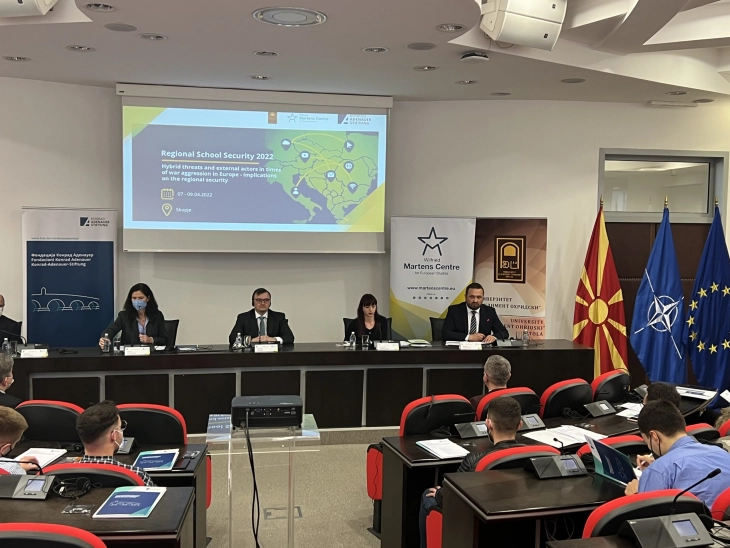Regional School Security 2022: Enlargement is security issue and tool to thwart Russian influence
- Post By Ivan Kolekevski
- 13:47, 7 April, 2022

Skopje, 7 April 2022 (MIA) – The German government is focused on the Western Balkans more than ever. It has appointed a special representative for the area and will continue to strengthen regional networking through the Berlin Process. However, the most important thing now is that the enlargement policy is becoming a security policy and should be given significant incentive, especially through the accession negotiations with North Macedonia and Albania, visa liberalization with Kosovo, more progress in relations with Serbia, and stability in Bosnia-Herzegovina, said German Ambassador Anke Holstein on Thursday.
Ambassador Holstein was addressing the “Regional School Security 2022: Hybrid threats and external actors in times of war aggression in Europe – implications on the regional security”, organised by the Konrad Adenauer Foundation, the St. Kliment Ohridski University of Bitola and the Wilfried Martens Centre for European Studies from Brussels.
“We should work on the principle of more for more, less for less. North Macedonia is sharing the entire set of sanctions through the implications on the sectors of energy, agriculture and shortage of markets. EU’s support is needed to ensure these problems are dealt with. It is becoming clear that Prespa and the painful compromise on the country’s traditional name has paid off. The country is now enjoying the security as NATO member. The NATO membership is a strong argument for North Macedonia as a business destination. Regarding enlargement, it is not about that infamous date for the start of the accession negotiations but more about the general domestic long-term reform processes that must speed up in order to build a more stable democracy and build resilience to the influence of political parties. We are also witnessing the astonishing effects of the Russian propaganda, through Serbia and across the region,” said Holstein.
Foreign Minister Bujar Osmani said in online remarks that the Russian invasion is not justified, while NATO, EU and western democracies have been united in its condemnation, producing timely sanctions on the Russian Federation and supporting Ukraine through humanitarian and financial assistance.
“As EU candidate, North Macedonia has contributed by aligning its policy with the EU while supporting all sanctions that the Union has imposed on Russia and opening its doors to all people fleeing the war.
“Our Parliament has overwhelmingly endorsed a declaration of support to Ukraine, we have also expelled five Russian diplomats and presented the Russian ambassador with a note of protest,” said FM Osmani.
The Regional School Security, held April 7-9 in Skopje, is a project implemented over the past seven years. It aims to foster exchange and friendship between the countries in the region and is focused on bringing together students and young professionals, as well as academics and experts from the region in order to discuss and exchange experience on current topics, tackling mainly regional security and regional cooperation.
This year’s event brings together students and academics from three countries in the region – North Macedonia, Bulgaria and Serbia – discussing and exchanging views on the topic of hybrid threats and external actors in times of war aggression in Europe, which concerns not only the countries in the area but the whole of Europe as well.







